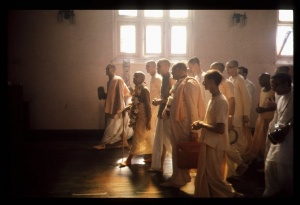SB 4.27.22: Difference between revisions
(Vanibot #0018 edit: make synonym terms in Sanskrit italic in SB - Vanisource) |
(Vanibot #0054 edit - transform synonyms into clickable links, which search similar occurrences) |
||
| Line 23: | Line 23: | ||
<div class="synonyms"> | <div class="synonyms"> | ||
''mayi'' | ''[//vanipedia.org/wiki/Special:VaniSearch?s=mayi&tab=syno_o&ds=1 mayi]'' — unto me; ''[//vanipedia.org/wiki/Special:VaniSearch?s=saṁrabhya&tab=syno_o&ds=1 saṁrabhya]'' — having become angry; ''[//vanipedia.org/wiki/Special:VaniSearch?s=vipula&tab=syno_o&ds=1 vipula]'' — unlimited; ''[//vanipedia.org/wiki/Special:VaniSearch?s=madāt&tab=syno_o&ds=1 madāt]'' — out of illusion; ''[//vanipedia.org/wiki/Special:VaniSearch?s=śāpam&tab=syno_o&ds=1 śāpam]'' — curse; ''[//vanipedia.org/wiki/Special:VaniSearch?s=su&tab=syno_o&ds=1 su]-[//vanipedia.org/wiki/Special:VaniSearch?s=duḥsaham&tab=syno_o&ds=1 duḥsaham]'' — unbearable; ''[//vanipedia.org/wiki/Special:VaniSearch?s=sthātum&tab=syno_o&ds=1 sthātum] [//vanipedia.org/wiki/Special:VaniSearch?s=arhasi&tab=syno_o&ds=1 arhasi]'' — you may remain; ''[//vanipedia.org/wiki/Special:VaniSearch?s=na&tab=syno_o&ds=1 na]'' — never; ''[//vanipedia.org/wiki/Special:VaniSearch?s=ekatra&tab=syno_o&ds=1 ekatra]'' — in one place; ''[//vanipedia.org/wiki/Special:VaniSearch?s=mat&tab=syno_o&ds=1 mat]'' — my; ''[//vanipedia.org/wiki/Special:VaniSearch?s=yācñā&tab=syno_o&ds=1 yācñā]'' — request; ''[//vanipedia.org/wiki/Special:VaniSearch?s=vimukhaḥ&tab=syno_o&ds=1 vimukhaḥ]'' — having refused; ''[//vanipedia.org/wiki/Special:VaniSearch?s=mune&tab=syno_o&ds=1 mune]'' — O great sage. | ||
</div> | </div> | ||
Latest revision as of 21:43, 18 February 2024

A.C. Bhaktivedanta Swami Prabhupada
TEXT 22
- mayi saṁrabhya vipula-
- madāc chāpaṁ suduḥsaham
- sthātum arhasi naikatra
- mad-yācñā-vimukho mune
SYNONYMS
mayi — unto me; saṁrabhya — having become angry; vipula — unlimited; madāt — out of illusion; śāpam — curse; su-duḥsaham — unbearable; sthātum arhasi — you may remain; na — never; ekatra — in one place; mat — my; yācñā — request; vimukhaḥ — having refused; mune — O great sage.
TRANSLATION
The great sage Nārada continued: When I refused to accept her request, she became very angry at me and cursed me severely. Because I refused her request, she said that I would not be able to stay in one place for a long time.
PURPORT
The great sage Nārada Muni has a spiritual body; therefore old age, disease, birth and death do not affect him. Nārada is the most kind devotee of the Supreme Lord, and his only business is to travel all over the universe and preach God consciousness. In other words, his business is to make everyone a Vaiṣṇava. Under the circumstances, there is ordinarily no need for him to stay in one place for more than the time he requires to preach. Since by his own free will he is already traveling all over the universe, the curse of Kālakanyā is described as fortunate. Like Nārada Muni, many other devotees of the Lord are engaged in preaching the glories of the Lord in different places and in different universes. Such personalities are beyond the jurisdiction of material laws.